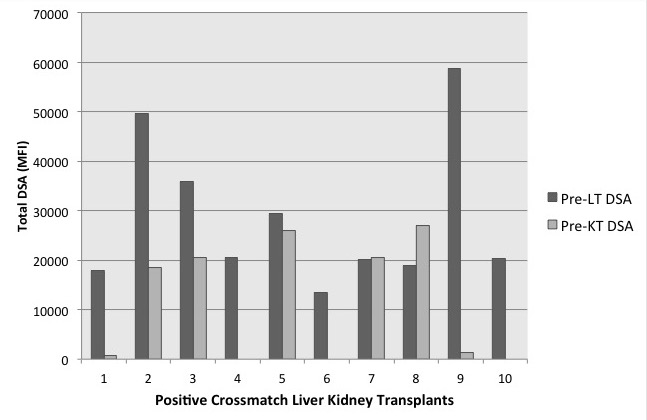Impact Of Delayed Kidney Transplantation On Positive Crossmatch Liver Kidney Transplantation
Department of Surgery, Indiana University Hospital, Indianapolis, IN
Meeting: 2019 American Transplant Congress
Abstract number: 44
Keywords: Alloantibodies, Flowcytometry crossmatching, Kidney/liver transplantation, Liver transplantation
Session Information
Session Name: Concurrent Session: Liver: Immunosuppression and Rejection
Session Type: Concurrent Session
Date: Sunday, June 2, 2019
Session Time: 2:30pm-4:00pm
 Presentation Time: 3:18pm-3:30pm
Presentation Time: 3:18pm-3:30pm
Location: Room 312
*Purpose: Kidney transplantation in sensitized patients is associated with an increased immunological risk. Significant decrease in circulating anti-HLA donor specific antibodies (DSA) has been observed after liver transplantation (LT). This property of liver allograft can be utilized to lower DSA levels prior to KT by delaying KT. Additionally, this approach may time to lower DSA by plasma exchange in patients with extremely high levels of DSA.
*Methods: 10 combined liver kidney transplants with pre-existing DSA were retrospectively studied. All patients had DSA quantified by Luminex solid-phase bead assay immediately preceding LT, and again immediately preceding KT. Kidney allografts remained on continuous hypothermic pulsatile perfusion until KT. Median cold ischemia time for kidney transplants was 48 hours. Rabbit anti-thymocyte globulin and rituximab based induction immunosuppression was used. Plasma exchange was utilized in of 6 of 10 cases with strong positive crossmatch.
*Results: A decrease in total Mean Fluorescence Intensity (MFI) of DSA following LT was observed in 8 of 10 by an average decrease of 17,060 (- 56.7%) MFI. In 5 patients, there was negligible amount of DSA detected at the time of KT. Decrease in MHC Class I antibody was significantly higher than that in Class II (P < 0.05). Decrease in DSA was comparable regardless of plasma exchange (P = 0.22). Patients without significant decrease in DSA had previous transplants. Mild acute cellular rejection was seen in one patient which resolved immediately. There was no incidence of delayed renal graft function and acute humoral rejection. Overall patient survival was 90%.
Figure: Change in total DSA following liver transplantation and prior to kidney transplantation. Cases 1,5,6 and 7 did not receive plasma exchange. Cases 5, 7 and 8 (without significant decreases in DSA) were re-transplants.
*Conclusions: This series demonstrates that delaying KT allows quantifiable reduction in circulating DSA after LT and prior to KT with and without plasma exchange. With this approach, excellent clinical outcomes can be achieved in crossmatch positive liver kidney transplantation.
To cite this abstract in AMA style:
Rokop Z, Kubal C, Ekser B, Mangus R, Fridell J, Mihaylov P, Goggins W. Impact Of Delayed Kidney Transplantation On Positive Crossmatch Liver Kidney Transplantation [abstract]. Am J Transplant. 2019; 19 (suppl 3). https://atcmeetingabstracts.com/abstract/impact-of-delayed-kidney-transplantation-on-positive-crossmatch-liver-kidney-transplantation/. Accessed July 13, 2025.« Back to 2019 American Transplant Congress

